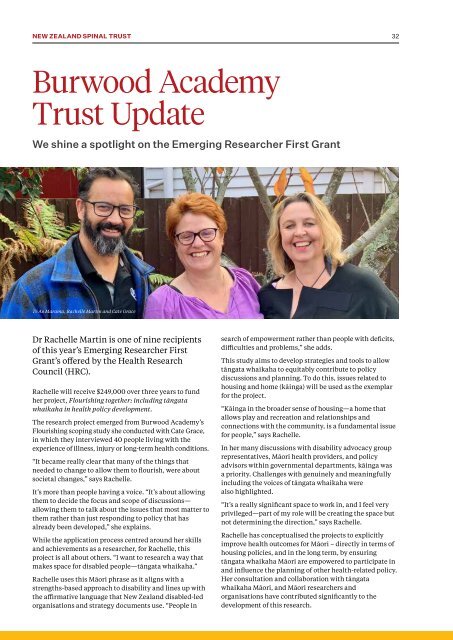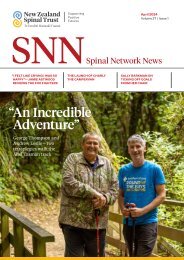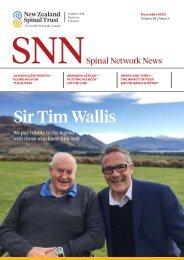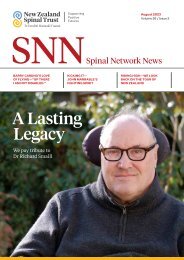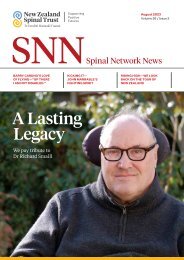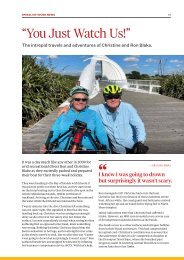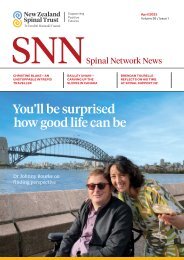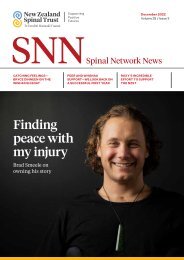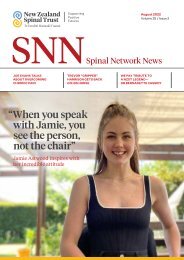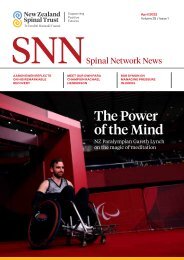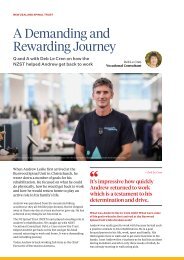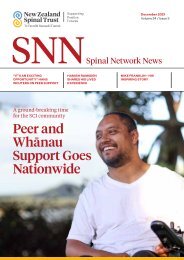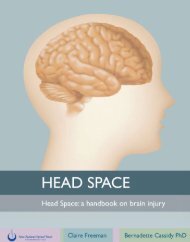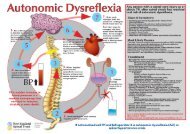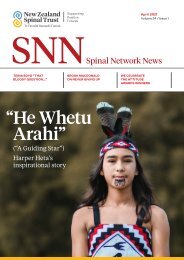SNN_July 2021 Issue_web low res
You also want an ePaper? Increase the reach of your titles
YUMPU automatically turns print PDFs into web optimized ePapers that Google loves.
NEW ZEALAND SPINAL TRUST 32<br />
Burwood Academy<br />
Trust Update<br />
We shine a spotlight on the Emerging Researcher First Grant<br />
Te Ao Marama, Rachelle Martin and Cate Grace<br />
Dr Rachelle Martin is one of nine recipients<br />
of this year’s Emerging Researcher First<br />
Grant’s offered by the Health Research<br />
Council (HRC).<br />
Rachelle will receive $249,000 over three years to fund<br />
her project, Flourishing together: including tāngata<br />
whaikaha in health policy development.<br />
The <strong>res</strong>earch project emerged from Burwood Academy’s<br />
Flourishing scoping study she conducted with Cate Grace,<br />
in which they interviewed 40 people living with the<br />
experience of illness, injury or long-term health conditions.<br />
“It became really clear that many of the things that<br />
needed to change to al<strong>low</strong> them to flourish, were about<br />
societal changes,” says Rachelle.<br />
It’s more than people having a voice. “It’s about al<strong>low</strong>ing<br />
them to decide the focus and scope of discussions—<br />
al<strong>low</strong>ing them to talk about the issues that most matter to<br />
them rather than just <strong>res</strong>ponding to policy that has<br />
already been developed,” she explains.<br />
While the application process centred around her skills<br />
and achievements as a <strong>res</strong>earcher, for Rachelle, this<br />
project is all about others. “I want to <strong>res</strong>earch a way that<br />
makes space for disabled people—tāngata whaikaha.”<br />
Rachelle uses this Māori phrase as it aligns with a<br />
strengths-based approach to disability and lines up with<br />
the affirmative language that New Zealand disabled-led<br />
organisations and strategy documents use. “People in<br />
search of empowerment rather than people with deficits,<br />
difficulties and problems,” she adds.<br />
This study aims to develop strategies and tools to al<strong>low</strong><br />
tāngata whaikaha to equitably contribute to policy<br />
discussions and planning. To do this, issues related to<br />
housing and home (kāinga) will be used as the exemplar<br />
for the project.<br />
“Kāinga in the broader sense of housing—a home that<br />
al<strong>low</strong>s play and recreation and relationships and<br />
connections with the community, is a fundamental issue<br />
for people,” says Rachelle.<br />
In her many discussions with disability advocacy group<br />
rep<strong>res</strong>entatives, Māori health providers, and policy<br />
advisors within governmental departments, kāinga was<br />
a priority. Challenges with genuinely and meaningfully<br />
including the voices of tāngata whaikaha were<br />
also highlighted.<br />
“It’s a really significant space to work in, and I feel very<br />
privileged—part of my role will be creating the space but<br />
not determining the direction,” says Rachelle.<br />
Rachelle has conceptualised the projects to explicitly<br />
improve health outcomes for Māori – directly in terms of<br />
housing policies, and in the long term, by ensuring<br />
tāngata whaikaha Māori are empowered to participate in<br />
and influence the planning of other health-related policy.<br />
Her consultation and collaboration with tāngata<br />
whaikaha Māori, and Māori <strong>res</strong>earchers and<br />
organisations have contributed significantly to the<br />
development of this <strong>res</strong>earch.


